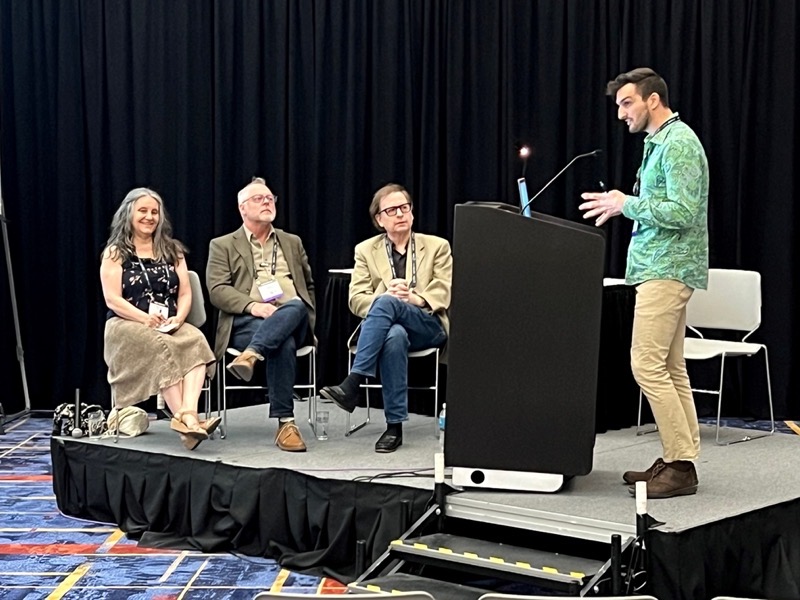Thanks to my friend and colleague, Ed Fink I was invited to join a couple of panels at this year’s BEA (Broadcast Education Association) conference in Las Vegas last weekend.

One panel involved giving feedback on student pitches for TV shows or films and the other was more of a Q&A about careers in screenwriting. On both I was joined by other friends and colleagues from the writing world and the world of academia – David Morgasen (CSUF) and Jon Vandergriff (who teaches at a couple of colleges and happily one of them is the Stephens College MFA in TV and Screenwriting).

The stories we heard in the pitches were lively and several were quite unique, as were the questions about how to gain – and then maintain – a career in writing.
Afterward, the panels ended we three stood in the hallway so long continuing to answer questions such that we invited a few of the stragglers to dinner with us. Since we landed at Benihana we were joined by a father and son from Trinidad and Tobago who were in town for the father’s 30th NAB conference. During our conversation when they heard us mention Ted Lasso they had to ask how a country that doesn’t understand soccer/futbol watches a show set in that world. The film students with us were able to explain that from their generation forward, many, many young American children play on soccer teams – largely because they are co-ed in the younger years whereas baseball and softball segregate the sexes. Amazing the way a conversation ebbs and flows over flame-grilled shrimp and steak.




![11 Gloalizing The Story from The Doctor Who Changed the TV Universe – Dr. Rosanne Welch [Video]](https://rosannewelch.com/wp-content/uploads/2023/03/sdwhocon-2022-dwtv-11.jpg)
![Doctor Who in Hollywood from The Doctor Who Changed the TV Universe – Dr. Rosanne Welch [Video]](https://rosannewelch.com/wp-content/uploads/2023/03/sdwhocon-2022-dwtv-10.jpg)
![Join Dr. Rosanne Welch for a Free Web Conversation on Writing as Activism, Friday, April 7, 2023 [Online]](https://rosannewelch.com/wp-content/uploads/2023/03/WritingAsActivism.png)
![09 90210 and Baywatch from The Doctor Who Changed the TV Universe – Dr. Rosanne Welch [Video]](https://rosannewelch.com/wp-content/uploads/2023/03/sdwhocon-2022-dwtv-09.jpg)
![08 Going Global from The Doctor Who Changed the TV Universe – Dr. Rosanne Welch [Video]](https://rosannewelch.com/wp-content/uploads/2023/03/sdwhocon-2022-dwtv-08.jpg)
![07 Conventions from The Doctor Who Changed the TV Universe – Dr. Rosanne Welch [Video]](https://rosannewelch.com/wp-content/uploads/2023/02/sdwhocon-2022-dwtv-07.jpg)
![06 Longevity from The Doctor Who Changed the TV Universe – Dr. Rosanne Welch [Video]](https://rosannewelch.com/wp-content/uploads/2023/02/sdwhocon-2022-dwtv-06.jpg)
![05 Scooby-Doo and SVU from The Doctor Who Changed the TV Universe – Dr. Rosanne Welch [Video]](https://rosannewelch.com/wp-content/uploads/2023/02/sdwhocon-2022-dwtv-05.jpg)